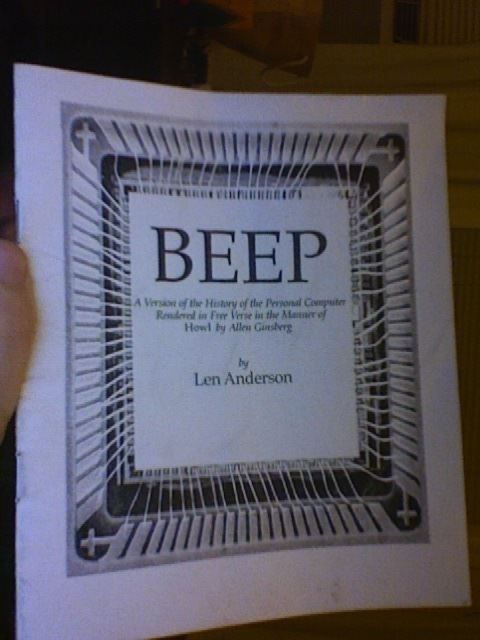I’ve started dreaming again. I don’t mean this metaphorically — for the last few years, I’ve dreamt very very rarely and could not remember anything of the dreams when I did.
A few nights ago, I had a wonderful dream, integrating lots of metaphorical images of San Francisco, full of dioramas and mise en scenes, a giant commune-theme-park in the mountains, full of the nicer kinds of aging in drag and with guns, where I wandered with Liz and Ada, and got into miscellaneous (and continuous) adventures. It went on for hours, and I woke up open-mouthed.
I don’t know what it means, or whether it will continue. It may just mean that I had more grilled cheese on toast than I should have done (I have something stomachy and unpalatably unbloggable going on, which involves me inventing a low residue diet while it resolves, so plenty of cheese and bread for me).
But I’ve also noticed my writing capacity eking up. Also, I realised earlier this year that I’ve answered my two big questions for the last decade, at least to my satisfaction. They were, nostalgia-fans: “How deep a culture is geek culture?”, and:”How many people do you need to be famous for?”.
The second wasn’t really my question, it was Stew’s (at least, it was his response to NTK‘s micro-pico-celebrity that prompted it), and so it’s fitting that he answered it. In a piece about being unable to evade druck heckling English rugby fans, even in New Zealand, he noted:
In the mid-90’s I was on television, and was of the mistaken belief that this represented a logical end-point in comedy. Returning to stand-up recently after four years off, the actual numbers game seems much simpler. I need about 7000 fans. If each of them gave me about £5 a year after tax, agent’s commission and travel expenses, I would be making a fine living, and probably never having to deal with sports fans coming to my shows. There is no need for that 7000 strong audience to include English rugby fans. If I can find some way of operating at such a level whereby they never find me, I could have the most wonderful life.
(Stew will probably now be picketed by thousands of fundamentalist rugby fans, furious at his blasphemous comments.)
So, there you go, the answer is: 7000 people. It sounds about right.
The first question was “how deep a culture is geek culture?”, and I have always had terrible problems explaining it, or how I would know when I had found an answer. The nugget explanation I gave was that I wanted to know whether geekdom was intergenerational: was it like the beatniks, or the mods, likely to be buried in aspic within a decade of its beginning. Or did it have more life than that: like Quakers at one end, or Goths at the other; able to leap generationally, and grow a depth beyond the years of its earliest creators?
I declare that I have discovered the answer to this now, but I’m not sure I can show it to you. It’s a small pamphlet by Len Anderson, a poet from Santa Cruz. It’s a wonderful, 15-page parody of Howl, giving the history of the personal computer.
1.0I saw the best minds of my generation destroyed by MS-DOS in T-shirt & sneakers eating microwave popcorn,dragging themselves through endless dungeon arcades at dawn looking for an angry joysticklonghaired hackers burning for the serial port connection to the silicon dynamo that powers the machinery of thought &mdash

3.0Bill Gates! I’m with you in Redmond
where you’re the richest man in the country, engaged to be married, building a new home that includes a nursery and you are madder than I amSteve Jobs! I’m with you in Silicon Valley
where you still dream the next dream and have a wife, a home, kids, a dog and like it and still are madder than I amSteve Wozniak! I’m with you in Los Gatos
where now you’re retired and built a cave playhouse for your children and you must feel very strange! and I think we’re both about equally mad
It’s beautiful and funny and to me, who so often can only mediate my emotional reactions through accurate parodies, quite moving.
It was also, as you might be able to tell from the second extract, written over a decade ago, in 1993. It doesn’t feel like history, though. It doesn’t even feel that much like nostalgia. The litany it reels off (before Gates and after), would wring a response from a whole class of geeks aged from fifteen to their fifties. It feels like a plumb-line on the sort of depth I was looking for.
Deep enough, then. Deep sleep with enough deep dreams.
